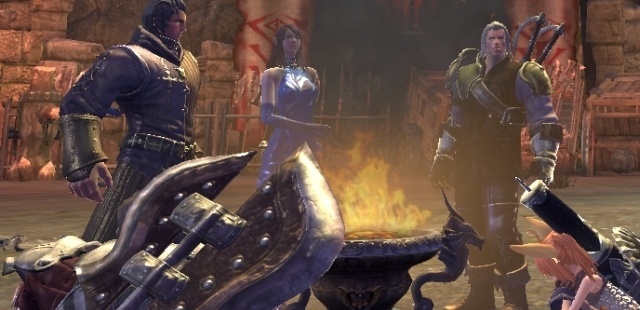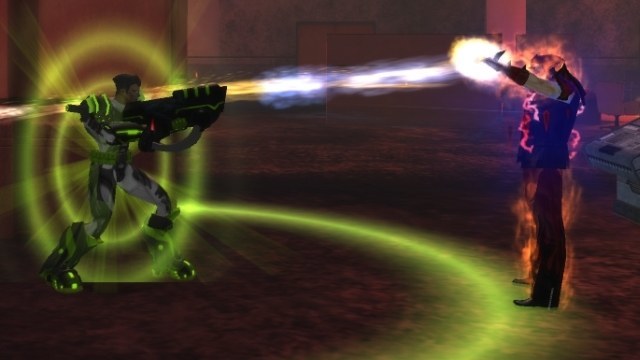Enjoy the Guild Guide column? Keep up to date with our new Twitter account @GuildGuide!
Communities, when they get large enough, start to generate their own gravity. You see it happen time and again; you go from having just a few members to having a lot of members. And while you almost certainly have a selection process to make sure that people don’t sign on while being dramatically counter to your stated aims as a group… well, despite your best efforts, some people just sneak through. It’s only obvious after the fact.
So how do you deal with these problem members? It depends a great deal on what makes them problematic in the first place. Some members are just a few nudges away from being great members, and as an officer or a member you need to provide those gentle nudges to make it happen. Other members… there’s not a whole lot you can do.
The Overeager
You have probably, at some point, had to deal with an overly enthusiastic sibling who wanted to come along no matter what you were doing. Regardless of whether or not your activities were appropriate for that sibling. The Overeager is, fundamentally, exactly that in guild form, someone who is so painfully friendly and talkative and eager for participation that they never, ever can just let something pass without incident.
 Participation is a good thing, of course, but this sort of player takes it too far. If for whatever reason you don’t want them to accompany you for something, you have to carefully avoid them and make sure they never see you ask. Otherwise, they want to be a part of it. It’s true whether or not they’re very good.
Participation is a good thing, of course, but this sort of player takes it too far. If for whatever reason you don’t want them to accompany you for something, you have to carefully avoid them and make sure they never see you ask. Otherwise, they want to be a part of it. It’s true whether or not they’re very good.
Luckily, as problematic people go, this is also very easy to deal with. This member isn’t being hurtful or aggressive or nasty, just a little too eager to jump into everything. More often than not, asking him to back off a little bit is enough to make it clear that he’s coming on a bit too strong, and that’s easily corrected.
The Carry (AKA The Leeroy Jenkins)
No, this does not mean the highest damage dealer on your team in League of Legends, although at times the problem is that the person in question is trying to do precisely that and not doing a good job of it. The Carry is the player in your community who isn’t just bad; they turn being bad into an art form. And they want to come with you to your next run.
Sometimes, this is a subtle thing. It’s not that the Carry wants to be bad, it’s that she just doesn’t realize how clueless she is to the environment she’s playing in. Nor is it that she’s aggressively harmful to the group, she just gets hit by every ability that can be dodged, misses every single important prompt, never remembers to use her healing abilities when it would be appropriate. In a MOBA, she’s the one who charges forward and doesn’t realize that she needs to wait for others before trying to take a lane (or to focus on another lane for a while). In an FPS, she’s trying to charge the enemy not aware that the game is now much more of a defensive match and she’d be better served by waiting.

At other times, the Carry is an active detriment to the team. This is the guy who doesn’t just fail to know the strategies but actively avoids learning about them no matter how advantageous or necessary it would be. He doesn’t just fail to dodge, he clicks the doodad in a raid fight way too early and ensures a wipe. He’s not just making a futile and pointless charge on the enemy base, he’s leading the enemy back through where you’re trying to hide for a stealth attack. In a competitive game, he may as well be on the other team for all the help he’s providing.
What holds this player back is the fact that there’s a certain point when you’re so bad at the game, you don’t actually realize how bad you are. If you can teach these players and they’re willing to practice and learn, you can correct any problems. Players who aren’t willing to learn and keep holding the group back, though, or take their ignorance as a badge of honor… those are the people to politely ask to leave.
A community is a group effort. People who want to be a part of the group without learning to actually work with the group are, ultimately, weakening that community.
The Ego
This is the flip side of the last entry, to an extent. The Ego is not a player who can’t play the game and holds you back, although that doesn’t mean that he’s actually very good – just that he’s not an active detriment. What does matter is how good he thinks he is, and even moreso, how much criticism he’s willing to take or dispense.

Stereotypically, the Ego is one of the best players in the game, but in experience I’ve found that’s rarely the case. The best players are usually friendly, helpful, and happy to offer advice when they can. The Ego is a few notches below that, so focused on trying to be close enough to the best that he won’t allow anyone to so much as nudge his throne.
If you’re underperforming at anything, he’ll tell you in a second. He has nothing but harsh words. Made a minor mistake in Dota 2? He’ll be chewing you out for at least ten minutes about it, even though if he makes the same mistake he’ll explain how it either wasn’t his fault or was part of a carefully calculated plot.
Unfortunately, this sort of player is also a bit more difficult to repair, because his problem is not fundamentally that he’s not good at the game, it’s that his attitude makes that skill irrelevant. So you have to frame the discussion carefully and explain to him, as gently as possible, that it’s not just about skill. If he can’t rein in his need to be seen as the best, and his need to talk to others as if he’s the best, then he just can’t stick around.
The Mooch
This is most common in MMOs, but it’s something you see from time to time elsewhere as well. Unlike the Carry, the Mooch doesn’t have a problem wherein she’s not very good at the game. No, her problem is that she wants stuff and she wants it now, and she doesn’t much care whether or not she’s actually doing the work to get any of it.
If you’re in a dungeon and some loot drops, the Mooch wants it. If she makes an event, it’s for the Mooch’s benefit. In an FPS with vehicles, she wants to drive one; in a MOBA, she wants to be the one killing the big creep. It’s not that she’s a bad player or unfriendly or any of that, it’s just that literally everything she does and says makes it very clear that she’s looking out for number one.

We’re all a bit moochy at times while we’re playing games, of course – we all like being able to have the cool stuff and look nifty and so forth. Inherently, it’s understandable. Where things get out of hand are with mooching members who don’t actually contribute anything beyond their presence and accidental benefits. A guild, a community, a player group – these are all fundamentally team ventures, not there to make one person feel better.
Making it clear to the player in question that she’s part of a group rather than the only person who matters is, hopefully, enough to convey that message. Sometimes, as an officer, you can go one better – you can make the player responsible for her own sub-group within the guild. By channeling that desire to get everything into a useful direction, some players really blossom and start thinking about the good of everyone rather than the good of their own in-game bank accounts.
Or they’ll just leave and take as much as they can carry with them. That’s a very real possibility, too. But at least the problem is solved.







Published: Apr 17, 2015 07:05 am